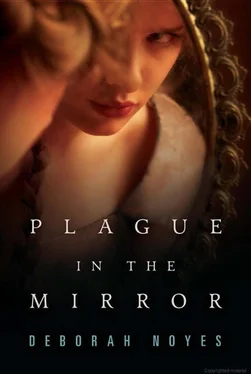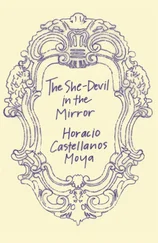“Yeah, but not all change is bad. Your parents are splitting,” he ventures, “but they love you. They did their best all these years, and you’re OK. You’re like a grown-up now, and you have choices. They have to be able to choose, too.”
“That’s bullshit. You know it is.”
“What? Which part?”
“‘They’re splitting up but they love you.’ That’s not the point. The point is they don’t love each other, and that’s not OK.”
“Anymore,” he adds firmly.
“Anymore,” she echoes.
“Which isn’t to say they didn’t, or that your whole childhood was a lie, or any psych-shit like that.”
In the same instant that May reaches out for more bread, Liam leans and tries to kiss her, almost missing her face completely. He grazes her cheekbone instead, and his lips feel wet and raw and surprising, not because Liam repels her — not that — but because he’s Li, and Li isn’t supposed to kiss her. “Whoa” is all she can say. Whoa.
Liam only looks at her, mortified probably, and May can’t say what’s worse, him hitting on her or him feeling embarrassed about it.
“Sorry,” he mumbles. “Really bad timing. You were trying to say something—”
“Timing? Shit, Li. What are you doing?”
He looks sort of stunned, his face unnaturally red, and all she can think of is when they were about six and seven and for no discernible reason she threw sand in his face at the beach. She’d sat there with her hands in her wet lap while he howled about being blind. He hadn’t cried but sort of gulped and stuck out his pudgy hands and groped the air, repeating his announcement —“ Blind, blind ”— in a small, vague voice as the waves rolled quietly over their legs and a seagull hovered on a current beside them, screaming. Finally Gwen (or was it Mom?) had seen him sitting there in his sagging fire-truck swim trunks, arms out in front of him like a deranged robot’s, and came and brushed him off and walked him back to the blanket. Alone, May listened while the ocean murmured without judgment. It was soothing, just as the wind on this hilltop and the boundless blue Tuscan sky are now. Sorry didn’t do it, the waves seemed to say, but there are bigger things… bigger than him, bigger than you, bigger than now.
Laced in with a feeling of excitement and curiosity about the morning’s weirdness and the man she met is a kind of profound sadness that she can’t explain to Liam, her childhood best friend. She would like to grab his arm and explain, to say that it won’t always be like this, weird and wrong, that someday it will be like it was before, or some other, better way, but not this way.
But Li, whose hands are no longer pudgy — they’re broad and long, with tapered fingers, she noticed when he was wiping away her tears — is already gone.
May sits a long while on his picnic blanket, feeling guilty, imagining he’ll come back when he calms down. He’ll come back when he’s taken a breath or two, had a look over the rooftops below, had a minute to think.
But he doesn’t, and at long last she cleans up those few scraps he didn’t take with him and starts down the hill. She takes her own time getting back, doesn’t want to arrive at the apartment before Gwen does, doesn’t want to run into Li before Gwen can make things right again with cheerful updates on shroud-sucking vampires.
She bears right onto Via Vecchia Fiesolana, the old road, passing a tabernacle with a Madonna and Saints, and on the right, the church of Saint Jerome. Next is the Villa Medici. Yet another handy sign explains that the villa was built by Michelozzo in 1458 for Cosimo the Elder and used by Lorenzo the Magnificent to host his literary friends. Besides the beautiful gardens, which she meanders through absently, there isn’t much remaining of the villa.
Heading out again, she reaches the terrace view that Queen Victoria liked so much she had her own bench installed there, and — was it left, now, or right… right — at the first intersection, the spot where the bishop of Fiesole, who lived in Florence, would rest on his way to his cathedral. These people are all dead now, May thinks with despair, circling back into San Domenico, with its church and convent, struggling out her phrase book so she can order a gelato in the shop across from the bus stop.
Ice cream is the only thing that makes sense anymore. This one’s a rich hazelnut chocolate and tastes so good she lets the first Number 7 bus go by. It’ll be a while before the next, an hour maybe. She knows that and just sits there taking long, slow licks like an animal cleaning its wound.
When she boards, she’s the only passenger and watches wistfully, trying to hold on to the taste of chocolate as the landscape blurs past in a flicker of late-afternoon sunlight.
May slips back into the apartment and isn’t surprised to find it empty. She settles on the overstuffed silky couch under the vaulted ceiling. That ceiling and the awesome terrace overlooking the Arno are the only real luxuries — the rest of the apartment is plain and modern; white stucco walls, terra-cotta tiled floors, a throw rug here and there. It’s airy and light, and May feels just fine with that after visiting all those dank, dark churches yesterday, however beautiful their contents or contours. She picks up her novel from the coffee table and tries to read, but a clock somewhere in the still-strange house ticks ominously, and she can’t concentrate.
Retreating to her room, May heads for the pile of research books on her desk, Gwen’s mostly. “You have all these papers to write, so why not choose a topic that draws on where you are,” Gwen advised, “or overlaps with the work I have you and Liam doing for me? Teachers — trust me; I am one — love visuals… the more, the better… so visit archives, take photos. Take advantage of this setting.”
Yeah, but write about what? To crowd out the fact that she’s possibly, probably, going insane, May closes her eyes, opens Gwen’s copy of Florence: An Encyclopedia at random, stabs her forefinger down, and opens her eyes again.
Black Death ( see also Plague).
Some lucky teacher’s getting a paper on plague.
Medieval travelers carried home exotic cargo, money, and spices, she reads, surprisingly drawn in, but also tales of terror and wonder. May sits back down and cracks the book’s spine in a way that would infuriate Gwen.
At the hearthside or a packed table at the inn, they murmured of strange beasts and stranger men, of lands where dragons swept the skies, of seas swarming with monsters. To the average European — a peasant born into poverty and hardship — the places in travelers’ tales seemed remote indeed.
Rumors of calamity began to reach major trade centers like Florence as early as 1346, but, like unicorns and dragons, distant disaster was not of immediate concern. Merchants spoke of famine in the fabled East, of drought, floods, and swarming locusts. They told of earthquakes bringing down mountains, enormous hailstones battering the earth, of fire raining down “in flakes like snow” from skies that might as easily bring storms of serpents, frogs, and scorpions. Worst of all was an infected wind, one so poisonous you could see it — a vicious, stinking smoke. Any who breathed this smoke dropped dead in the space of a day. This wind had mowed down millions, and there were fearful rumors of its progress.
Lifting the book, May snatches a notebook and pencil from the desk, then pads in bare feet out to the terrace, her favorite part of the apartment. From there she can look out over the rooftops at the edge of the city, which butt right up to the wide Arno, with its ancient bridges and green hills beyond. She settles into an iron chair beside a planter, with her feet on the railing, enjoying the sun on her face a moment, and reads on.
Читать дальше












